May 29, 2012
Edited by David Sanders
Specimen Days
May 29, 2012
1892 – Alfonsina Storni, Argentine poet (La inquietud del rosal), is born.
1912 – John B M R “John” Hanlo, Dutch poet (Go to the Mosque), is born.
1957 – George Bacovia [Vasiliu], Romanian poet/composer (Plumb), dies at 75.
1958 – Juan Ramon Jiménez, Spanish poet (Nobel 1956), dies at 76.
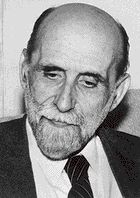 I pulled on the reins,
I pulled on the reins,
I turned the horse
of the dawn,
and I came in to life, pale.
Oh how they looked at me,
the flowers of my dream,
insane,
lifting their arms to the moon!
—Juan Ramon Jiménez (1881–1958)
Poetry In The News
Original William Stafford Poem Discovered in APSU Library
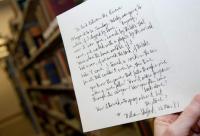 On a Wednesday morning in April, Kentucky journalist and author Carol Niswonger was busy combing through the archives at Austin Peay State University’s Woodward Library, conducting research for her new book on Land Between The Lakes, when she discovered something a bit unusual. Tucked away in a thin, manila folder was a short, handwritten poem titled “The Land Between the Rivers.” “When I started to read it, I said, ‘That’s it perfectly,’” Niswonger said. “The poem, it epitomized the feelings of that area. It had such an emotional attachment to the land and the surroundings. I thought the poet was someone who lived there.” Read more at The Leaf Chronicle.
On a Wednesday morning in April, Kentucky journalist and author Carol Niswonger was busy combing through the archives at Austin Peay State University’s Woodward Library, conducting research for her new book on Land Between The Lakes, when she discovered something a bit unusual. Tucked away in a thin, manila folder was a short, handwritten poem titled “The Land Between the Rivers.” “When I started to read it, I said, ‘That’s it perfectly,’” Niswonger said. “The poem, it epitomized the feelings of that area. It had such an emotional attachment to the land and the surroundings. I thought the poet was someone who lived there.” Read more at The Leaf Chronicle.
Letting Jazz Have a Turn Interpreting the Poets
Jazz at Lincoln Center did something really self-assured last week. It presented two major large-ensemble pieces by members of its orchestra, neither very well known as composers, for a three-night run at the Rose Theater: “God’s Trombones,” by the trombonist Chris Crenshaw, and “Inferno,” by the saxophonist Sherman Irby. Each was about the length of an LP and based on a book of poetry. “God’s Trombones” drew on the 1927 work of the same name by James Weldon Johnson, seven connected poems using the rhetoric of the black American church service; “Inferno” drew on Dante. Read more at the New York Times.
“Villanelle” for a Choir
The sound of a Harvard Commencement, for many, is the sound of choirs singing — exposed, organic, human. “To write for voices alone is a great challenge—it’s one of the purest tests of a composer’s craft and ingenuity,” says Richard Beaudoin, preceptor of music. The subtleties of the unaccompanied voice have occupied much of his time and concentration lately: President Drew Faust commissioned Beaudoin to write a setting of Seamus Heaney’s poem “Villanelle for an Anniversary” for this year’s Commencement. Read more at Harvard Magazine.
World Poetry
The Oldest Known Poem Comes to Lisburn Museum
The Bangladesh government has blocked the website of journalist and human rights activist William Gomes, for having published the poem, “Anti state.” In the poem, this human rights activist made plain his grievance against the corruption and injustice that is going on in Bangladesh. Read more at Salem-News.
Odes to Turbulent Times, from India’s “Bhasa” Poets
The new vernacular poetry in India is moving away from the softer shades of nature and love — the genre made famous by poet Rabindranath Tagore — to negotiate the turbulent contemporary times by addressing stark social realities. Contemporary vernacular poetry is becoming more strident according to the changing social constructs, agreed a cross-section of contemporary poets who were in the capital last week at a daylong session titled “Indian Poetry Festival: The Word in the World.” Read more at Two Circles.
New Books
Collected Poems by Naomi Replansky
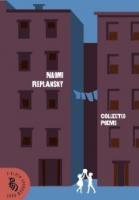 [Paperback] Black Sparrow Press, 128 pp., $17.95
[Paperback] Black Sparrow Press, 128 pp., $17.95
Nominated for the National Book Award in 1952, Naomi Replansky’s first book Ring Song dazzled critics with its candor and freshness of language. Here at long last is the new and collected work of a lifetime by a writer hailed as “one of the most brilliant American poets” by George Oppen. Replansky is a poet whose verse combines the compression of Emily Dickinson, the passion of Anna Akhmatova, and the music of W. H. Auden. These poems, which Marie Ponsot calls “sixty years of a free woman’s song,” are Replansky’s hymns to the struggle for justice and equality and to the enduring beauty of life in our dangerous world.
Selected Poems by Vladimir Nabokov
[Hardcover] Knopf, 240 pp., $30.00
Though we know Vladimir Nabokov as a brilliant novelist, his first love was poetry. This landmark collection brings together the best of his verse, including many pieces that have never before appeared in English.
The Ground: Poems by Rowan Ricardo Phillips
 [Hardcover] Farrar, Straus and Giroux, 96 pp., $23.00
[Hardcover] Farrar, Straus and Giroux, 96 pp., $23.00
A poignant and terse vision of New York City unfolds in Rowan Ricardo Phillips’s debut book of poetry. A work of rare beauty and lyric grace, The Ground is an entire world, drawn and revealed through contemplation of the post-9/11 landscape. With musicality and precision of thought, Phillips’s poems limn the troubadour’s journey in an increasingly surreal modern world (“I plugged my poem into a manhole cover/ That flamed into the first guitar”).
Complete Poems by C. P. Cavafy
[Paperback] Knopf, 752 pp., $35.00
An extraordinary literary event: Daniel Mendelsohn’s acclaimed two-volume translation of the complete poems of C. P. Cavafy—including the first English translation of the poet’s final Unfinished Poems—now published in one handsome edition and featuring the fullest literary commentaries available in English, by the renowned critic, scholar, and international best-selling author of The Lost.
Recent Reviews
Hot Ice and Wondrous Strange Snow
by Tamsin Smith
I often marvel at how one slim volume of verse can contain so much of the world’s grandeur. Book covers, no matter how well designed, barely hint at the epic enchantments that lie within. I savor the moment when I press the spine of a poetry book against my palm and begin to coax free its wondrous secrets. In truth, not every poetry collection works its rapturous alchemy between the sheets of printed pages. As in life, some packages disappoint. But the ones that deliver on deep delight do so hugely. They are worth waiting for. They are worth savoring. They breathe. They stir. They sing. They linger. Pity the Beautiful is a shining example. Read more at Huffington Post.
Selected Correspondence of Kenneth Patchen
by Phil Constable
The life of Kenneth Patchen could almost be the archetype of what we all grew up thinking of as the struggling artist. Poverty, ill health, obscurity, and misunderstanding saved late in the day by the deus ex machina: a grant from the Arts Foundation. What’s more, he appears to have been a bit cantankerous, too. All in all, Patchen’s life was just what one would expect that of a poet of his generation. Read more at the New York Journal of Books.
Natural Experiments
Embracing Poetry’s Failure
by Christopher Schmidt
One way to get a handle on experimental poetry is not to think of experiment as shorthand for difficulty or opacity but instead to take on good faith the word’s origin in scientific method. Consider the poetic experiment as akin to the scientific one, designed to discover and literally sound new knowledge about the world, its mysteries, its injustices. Read more at the Boston Review.
“One by One I Proclaim Your Songs”: The Poetry and Translations of William Carlos Williams
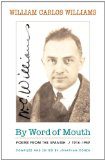 by Greer Mansfield
by Greer Mansfield
Ezra Pound in a letter to William Carlos Williams, 1908: “Perhaps you like pictures painted in green and white and gold and I paint in black and crimson and purple?” Pound had a point. He was right to imagine his friend’s poems — even at the beginning of both of their careers — in light, fresh colors: the colors of marigolds, asphodels, and seawater. Whatever the “colors” of a Williams poem, he painted them sharply and vividly, giving his work a rare vividness and a compact, graceful energy. Read more at Bookslut.
Correspondences
Frances Richard and Anne Waldman
In 2011, poet, performer, and activist Anne Waldman published her complete feminist epic Iovis: Colors in the Mechanism of Concealment (Coffee House Press) which began in 1993 with volume I, “All is Full of Jove,” and continued in 1997 with volume II, “Guardian & Scribe.” Waldman’s new book— perhaps her most ambitious, radical work to date—collects these previous volumes and adds a new, third volume, “Eternal War.” Read more at Bomb.
Interview: Andrew Motion
 by Anne Meller
by Anne Meller
The first to don the laurel wreath for a fixed term, Andrew Motion was Poet Laureate between 1999 and 2009. The laureateship has matched writing to royalty, and poet to power, for almost four centuries. Taught by Auden, and befriended by Larkin, the writer has lived a literary life. Knighted for his services to literature, he has always treasured others’ stories, both fictional and real, as well as his own. Now, with the publication of Silver, Andrew Motion is entering a new chapter. Read more at The Yorker.
Broadsides
What Do I Know? (Or, why I’m giving up post-modern poetry to live an irony-free life.)
by Leontia Flynn
One theory holds that Northern Irish poets “share elements of an outlook – ironic, stylish, suspicious of obvious sincerity” (Martin Mooney’s words, in the book of interviews with poets In the Chair), but in fact when I was growing up, all the best culture was like this: ironic, referential and – God help me – ludic. In the 1990s, the films of the Coen brothers and Quentin Tarantino played in multiplexes as well as art house cinemas, and I can’t have been the only one who was too young to appreciate their references and flirtation with pastiche, but enjoyed them anyway. Read more at Edinburgh Review.
Is Poetry Always Lost in Translation?
 by Phoebe Taplin
by Phoebe Taplin
A poem is an artifact constructed from carefully chosen words; changing the language can’t help but – in some part – destroy the original creation. RBTH literary critic Phoebe Taplin explores Russia’s resurgent poets—in English. Russia has a rich tradition of poetry. It stretches from ancient epics and Alexander Pushkin’s golden age, through the silver age of Boris Pasternak and Marina Tsvetaeva, to the fraught, but resurgent poetics of the present day. In one of several recent collections of contemporary Russian poets in English, Anatoly Kudryavitsky quotes from Joseph Brodsky’s “The Keening Muse”: “Language is older than the state, and prosody always survives history.” Read more at Russia Beyond the Headlines.
Farewell to Novels
by David R. Slavitt
The writing goes well, the business of dealing with publishers does not, and I try to maintain my grande indifference. I tell myself that it would be worse if the publishers were eager for whatever I produced, while I was unable to do any work that satisfied me. I have given up novels because my latest — and almost certainly last — The Duke’s Man, took me a year to write and then 10 years to sell. Read more at LA Review of Books.
Drafts & Fragments
Sandburg at Chicago NATO Summit
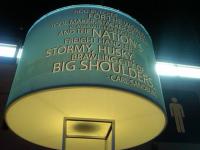 Carl Sandburg made an appearance at the Chicago NATO Summit — at least in name.
Carl Sandburg made an appearance at the Chicago NATO Summit — at least in name.
The Life and Works of William Butler Yeats
Envoi: Editor’s Notes
I Will Show You Arcade Fire in a Handful of Dust: Why Pop Music Loves T. S. Eliot
The New Yorker critic Louis Menand, reflecting on T. S. Eliot’s transition from radical modernist to arch-conservative, wrote in a review of the poet’s letters: “He tried to shut the door on modern life. It was too late of course. He was the author of “Prufrock” and The Waste Land. He was already inside.” Eliot would not have loved pop music but pop music loves Eliot. Ninety years after the publication of The Waste Land, he remains the lodestar poet for ambitious songwriters. Read more at the Guardian.
If you think about it, it makes sense. Whatever it is about Eliot’s sharp and enigmatic imagery, his world-weariness and wordplay, that draws the sensitive young reader to it would naturally be a draw for the sensitive young songwriter as well, after the fever of morose teenage love songs has broken. And, as pop music leapt at the adult pretension that often makes it so endearing and resonant still, what an ideal place to land: a place where nobody knows quite exactly what you mean but you sound like what you’re saying is somehow real and it really matters. Pop music could have done a lot worse than to channel Old Possum. Now let’s go eat a peach.
—David Sanders